Today Mary Lawrence is here to discuss her Tudor era mystery, Death of an Alchemist.
Welcome, Mary. Let’s get started, shall we?
Tell us about your novel.
 ML: Death of an Alchemist is Book 2 in the Bianca Goddard Mysteries, a new series set in the final years of King Henry VIII’s reign. The series features the estranged daughter of an infamous alchemist who makes medicines for the sick. She combines herbal knowledge (learned from her mother) with alchemy (learned from her father). Death and murder are quite common in Tudor London. Bianca has a curious mind and seeks to understand disease as well as what motivates people to murder.
ML: Death of an Alchemist is Book 2 in the Bianca Goddard Mysteries, a new series set in the final years of King Henry VIII’s reign. The series features the estranged daughter of an infamous alchemist who makes medicines for the sick. She combines herbal knowledge (learned from her mother) with alchemy (learned from her father). Death and murder are quite common in Tudor London. Bianca has a curious mind and seeks to understand disease as well as what motivates people to murder.
In Death of an Alchemist, the sweating sickness is spreading. Bianca is working on a cure and seeks help from an elderly alchemist. Ferris Stannum has just discovered the elixir of immortality. He seeks to confirm his recipe with a colleague in Cairo, but the next day, Bianca finds him dead and his journal is missing.
Bianca believes he died under suspicious circumstances and returns home to find her husband has taken ill. When the journal mysteriously turns up in her room of Medicinals and Physickes, she dares to hope it could contain the secret to his recovery. But possessing the journal comes with great peril. An attempt is made on her life as she works to save John’s, and soon Bianca is caught in a race against time to save her husband as well as herself.
What prompted you to write about this historical event?
ML: I began writing Death of an Alchemist about the time when the U.S. was nervous about an E boli outbreak. Hemorrhagic diseases have been around for centuries—think Dengue Fever and the Yellow Fever. But because we were not familiar with E boli a lot of misinformation circulated and a kind of hysteria developed.
I started thinking about disease in centuries past, and realized that people operated on superstition and misinformation because there wasn’t any science in place to distinguish diseases or to understand them. In Tudor England, the “Sweat” was a well-known and much feared disease–“Merry at dinner, dead before dawn.” I asked myself what it would have been like back then trying to understand a mix of different diseases?
Every story or series about alchemy worth its weight needs to address the “elixir of immortality”. Since Bianca stands to lose the most important person in her life and has the chance to cure him of death permanently, I had her wrestle with plenty of philosophical questions.
I was also struggling with my own grief having lost my favorite cat and a close friend who had supported my writing for years before I ever got published. I shed a lot of tears writing this novel.
How closely did you stick to the historical facts? If you used them loosely, how did you decide whether to deviate from them?
ML: Symptoms of the Sweating Sickness are accurate. In the back of the book I explain to readers what is made up and what is not. If you write historical fiction you owe it to your readers to get facts as accurate as possible. No one is going to get history perfect and I’m constantly learning new things and cringing at what I have gotten wrong. But most important to me is getting the feel and the attitudes right for the time. Some folks take issue with Bianca being an independent woman, but I argue that there have always been independent women in the world. We don’t have many historical accounts about the lower classes and what history we do have has been recorded mostly by men. I’ve been careful to keep Bianca bound by the mores of her time—but I admit I have her step out some. I don’t think readers want to follow a demure, milquetoast solving murder mysteries.
What research did you do for this book?
ML: I read a steady diet of reference books and narratives about Tudor England. But for this particular book, I researched Hemorrhagic disease and learned about Macaws. I collect articles off the internet about Alchemy and read several books on it, plus thought about what chemical process I could use that would work in the book. I also read some philosophy about death and immortality and how Christianity views mortality and the soul.
Do you use a mixture of historic figures and invented characters in the novel. Which is more difficult to write? Which to you prefer to write and why?
ML: In this book, the characters are made up. I read about different occupations in Tudor England and then construct the characters around their social class and the values they hold most dear. Henry is mentioned and it is his policies that influence how people behave in the stories. So, while the King hasn’t an active role in my books, his laws are definitely felt.
In an historical novel you must vividly re-create a place and people in a bygone era. How did you bring the place and people you are writing about to life?
ML: I am a nut for maps. I’m thrilled that the AGAS map of Tudor London is live and interactive on the web now. I can use overlays for wards and parishes, important buildings. I don’t really want to visit London again, because I have a vivid picture in my brain of the streets and layout from 500 years ago. On top of the map study, I read a lot of old books on the era. I sit and imagine the world before I write about it. I also love the language and that is an ongoing struggle to find the right balance. I constantly check to see if certain words were used back then.
There often seems to be more scope in historical novels for male characters rather than female characters. Do you prefer to write one sex or the other. And, if so, why?
ML: I don’t have a preference. Bianca is my protagonist, but most of the characters in the series are men. I need to balance that out in the future. But I feel that men and women are basically the same at their core and everyone has their own motivations—which don’t necessarily revolve around gender issues.
Thanks for answering my questions so thoughtfully, Mary. For more information about Mary and her writing, readers can visit her website as well as her Facebook, Twitter, Pinterest, and Goodreads pages.
 About Mary Lawrence: She studied biology and chemistry, graduating from Indiana University with a degree in Cytotechnology. Along with writing and farming, Lawrence works as a cytologist near Boston. She lives in Maine.
About Mary Lawrence: She studied biology and chemistry, graduating from Indiana University with a degree in Cytotechnology. Along with writing and farming, Lawrence works as a cytologist near Boston. She lives in Maine.

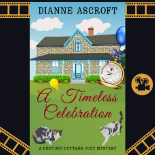




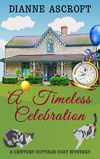

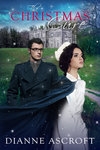
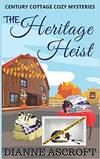
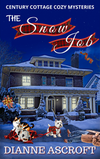
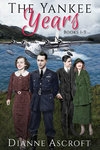

Thank you, Dianne, for hosting me on your blog.
My pleasure, Mary. Sorry I had to post it a bit later in the day than I usually post. Too many things on my to-do list and not enough hours! Good luck with your novel and the series it is in.